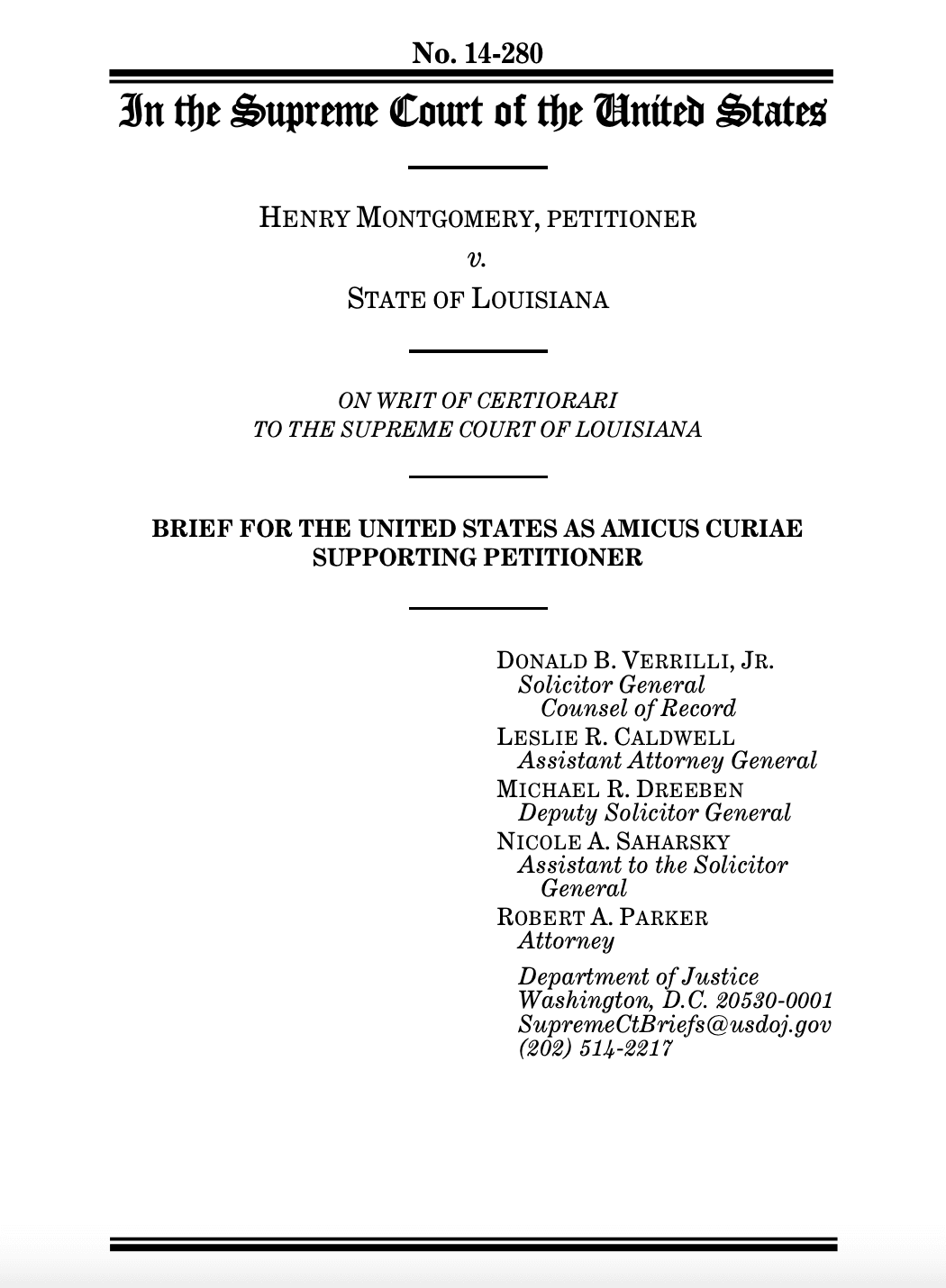
Summary of Argument
I. Miller v. Alabama, 132 S. Ct. 2455 (2012), announced a new substantive rule that applies retroactively to cases on collateral review.
A. Under Teague v. Lane, 489 U.S. 288 (1989), a new rule announced by this Court generally does not apply retroactively to cases that have become final on direct review. But a new rule applies retroactively in two circumstances. First, a new substantive rule, such as a rule that limits the conduct that is criminal or the punishment for certain offenders, is not subject to Teague and applies retroactively. Schriro v. Summerlin, 542 U.S. 348, 351-352 & n.4 (2004). Second, a new rule of procedure applies retroactively when it falls within the narrow category of “watershed” rules that “alter our understanding of the bedrock procedural elements” essential to a fair trial. Teague, 489 U.S. at 311 (plurality opinion) (emphasis and citation omitted).
B. The Miller rule is a “new” constitutional rule: it was not “dictated by” prior precedents. Teague, 489 U.S. at 301 (plurality opinion) (emphasis omitted). Rather, Miller combined and extended two strands of precedent—decisions that categorically preclude certain punishment for juvenile offenders because of their youth, and decisions that require individualized sentencing in capital cases—to conclude that the Eighth Amendment prohibits mandatory life-without parole sentences for juvenile homicide offenders. That lower courts had rejected such a rule before the Court’s decision further signals that Miller’s rule is new.
C. The Miller rule is substantive, not merely procedural. Miller’s holding that “the Eighth Amendment forbids a sentencing scheme that mandates life in prison without possibility of parole for juvenile offenders,” 132 S. Ct. at 2469, requires jurisdictions to provide a broader range of sentences than is available under a mandatory-life-imprisonment regime. Invalidating mandatory life-without-parole sentences for juvenile homicide offenders means that less severe sentences must be allowed. That expansion of sentencing outcomes is a substantive change in the law. Experience since Miller—in which juvenile homicide defendants have been resentenced to lesser sentences and jurisdictions have changed their laws—confirms that the decision worked a substantive change in the law.
Miller does have a procedural component, in that it requires individualized consideration of the appropriate sentence for a juvenile homicide offender. And that component is not a “watershed” procedural rule. But Miller is not essentially procedural, because Miller changes not only the process of sentencing, but also the range of sentences that are available.
Characterizing Miller as substantive aligns with Teague’s objectives. Rules with only procedural effects ordinarily are not retroactive because the interest in finality outweighs the speculative effect of the new rule on a conviction or sentence. But substantive rules that expand the available sentences raise a real risk that a person has been subjected to an unjustified punishment—a situation serious enough to justify reopening final cases. And recognizing that Miller announced a substantive rule is unlikely to lead to other rulings that would upset the finality of criminal sentences.
II. This Court has jurisdiction to review the Louisiana Supreme Court’s refusal to give retroactive effect to Miller.
A. The Louisiana Supreme Court has adopted all aspects of the Teague doctrine to govern the retroactivity of new federal constitutional rules to cases on state collateral review. Although a State may choose to give broader retroactive effect to federal constitutional decisions than would be afforded under Teague, see Danforth v. Minnesota, 552 U.S. 264, 282 (2008), the Louisiana Supreme Court has chosen to use Teague and to rely exclusively on federal decisions.
B. In Michigan v. Long, 463 U.S. 1032 (1983), this Court determined that when a state court’s decision rests primarily on, or is interwoven with, federal law, with no clear reliance on an independent state ground, this Court has jurisdiction to review the federal-law issue. Id. at 1040-1041. Here, the Louisiana Supreme Court’s decision finding Miller non-retroactive did rely exclusively on federal law, and not on any independent state retroactivity standard.
Long’s test does not conclusively resolve this case because an antecedent question exists: whether it matters that Louisiana chose to adopt Teague as its own test for retroactivity. In a typical Long case, federal law applies of its own force; here, Louisiana chose to apply federal law. But that does not preclude jurisdiction here, because, as this Court has explained, when a state court adopts federal standards and bases its decision on its interpretation of federal law, this Court has jurisdiction to review the application of those federal standards. Although no prior decision has addressed a situation entirely like this one, the principles animating this Court’s conclusion that it has certiorari jurisdiction to review embedded questions of federal law justify review of the federal question here. The Louisiana Supreme Court based its retroactivity determination on its understanding of Teague principles, and this Court may correct that understanding if it is mistaken.
It is particularly appropriate for this Court to correct the Louisiana Supreme Court’s mistaken understanding of federal law in this case for two reasons. First, correcting the state court’s Teague error avoids deciding a significant constitutional question: whether Teague’s exceptions to the general rule of nonretroactivity define a constitutional floor that a State must observe in its collateral review of federal constitutional claims. See Danforth, 552 U.S. at 269 n.4 (reserving this issue). Second, exercising jurisdiction based on the State’s incorporation of federal law furthers federalism principles by avoiding potentially intrusive federal habeas review, instead allowing the state court to correctly apply the federal law it has incorporated. This Court should reverse the judgment of the Louisiana Supreme Court and remand for further proceedings.